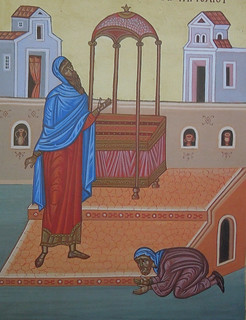 “Today we heard the parable of the Publican and the Pharisee (Lk. 18.10-14). It speaks of humility. I won’t repeat the story to you now, because you all know it perfectly well. But within the larger meaning of the parable, there’s something I’d like you to take careful note of. The Pharisee thought he knew God. He believed that he and God were friends. He was, however, mistaken in this belief, and it was rather the other man, the Publican, who was God’s friend.
“Today we heard the parable of the Publican and the Pharisee (Lk. 18.10-14). It speaks of humility. I won’t repeat the story to you now, because you all know it perfectly well. But within the larger meaning of the parable, there’s something I’d like you to take careful note of. The Pharisee thought he knew God. He believed that he and God were friends. He was, however, mistaken in this belief, and it was rather the other man, the Publican, who was God’s friend.
The Pharisee thought he knew God, but he didn’t. It’s not that easy to know God. But because he faithfully observed the outward rules of religion, he was under the false impression that God was somehow in his debt, that God owed him something. God for him was a kind of accountant, keeping a set of books showing what people owed him and what He owed them. But it’s not like that.
The moment the Pharisee said, I’m not like those other people (cf. Lk. 18.11), he cut himself off from God. Why? Because God is humble, and since the Pharisee felt no need for humility, it follows that he felt no need for God. He knew the law, and the traditions of his faith, but he did not know God.
 The Publican, on the other hand, had no illusions about himself. He was sunk up to his neck in the swamp of his sins. And yet, even though he was awash in the slime of his transgressions, what did he say to God? Be merciful to me a sinner (Lk. 18.13). And at the moment, in his sinful, suffering, disconsolate heart, he felt certain that he was justified (Lk. 18.14), which means that God recognized and received him. As a sinner he had been living in darkness, but his humility brought him into the light of paradise and granted him communion with God.”
The Publican, on the other hand, had no illusions about himself. He was sunk up to his neck in the swamp of his sins. And yet, even though he was awash in the slime of his transgressions, what did he say to God? Be merciful to me a sinner (Lk. 18.13). And at the moment, in his sinful, suffering, disconsolate heart, he felt certain that he was justified (Lk. 18.14), which means that God recognized and received him. As a sinner he had been living in darkness, but his humility brought him into the light of paradise and granted him communion with God.”
(Archimandrite Aimilianos, The Way of the Spirit, pp. 296-297)
